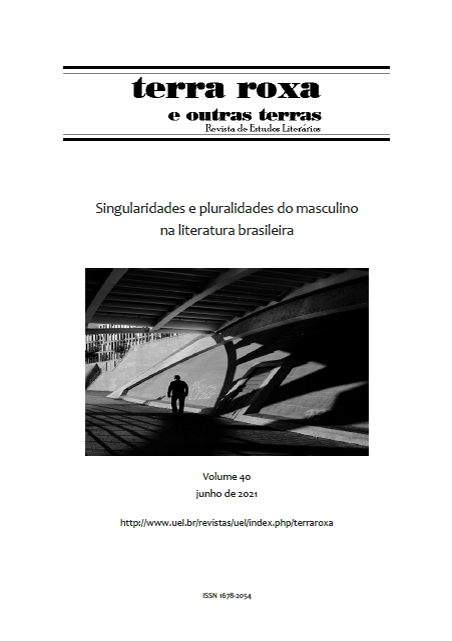Gregório de Matos and the masculinity of the resessed subject
DOI:
https://doi.org/10.5433/1678-2054.2021v40p35Keywords:
Gregório de Matos, Male, Poetry, Desire, BodyAbstract
This study intends to approach how the male voice behaves in the face of female refusal, the main motto of the satirical poem "Antonia", by Gregório de Matos. Especially, the reader is allowed to identify judgments, prejudices and defamations. With an arrogant and impulsive personality, the lirical subject reveals vanities, repressions and passions, hidden under the apparent superiority of cultured, nobleman and literary man. The idea of masculinity is a social construction and, in the poem in analysis, it is constructed by a discourse that opposes and degrades the feminine.It is clear that, after the prostitute's disdain for the noble lover's advances, his superiority and honor are recovered only by the supremacy of language.Downloads
References
BOURDIEU, Pierre. A dominação masculina. Trad. Maria Helena Kuhner. 11. ed. Rio de Janeiro: Bertrand Brasil, 2012.
CANDIDO, Antonio. Iniciação à Literatura Brasileira. São Paulo: Humanitas, 1999.
CONNELL, Robert W. Políticas da masculinidade. Trad. Tomaz Tadeu da Silva. Educação e Realidade, 20(2), jul-dez 1995, p. 185-206. Disponível em https://repositorio.ufsc.br/bitstream/handle/123456789/1224/connel_politicas_de_masculinidade.pdf?seq Acesso em 23 abr. 2021.
MATOS, Gregório de. "Antonia". Obra Poética. 3. ed. Rio de Janeiro: Record, 1992.
MICHAELIS. Dicionário Brasileiro da Língua Portuguesa. São Paulo: Melhoramentos, 2021. Disponível em https://michaelis.uol.com.br/moderno-portugues/busca/portugues-brasileiro/RESSENTIMENTO/ Acesso em 10 ago. 2021.
PAZ, Octavio. A dupla chama: amor e erotismo. Trad. Wladyr Dupont. 2. ed. São Paulo: Siciliano, 1994.
Downloads
Published
How to Cite
Issue
Section
License
Copyright (c) 2021 Terra Roxa e outras Terras

This work is licensed under a Creative Commons Attribution 4.0 International License.
Authors who publish in this journal agree to the following terms:
a) The authors retain the copyright and grant the journal the right of first publication, the work being simultaneously licensed under the Creative Commons Attribution-NonCommercial 4.0 International License, allowing the sharing of the work with acknowledgment of the authorship of the work and initial publication in this journal.
b) Authors are authorized to assume additional contracts separately, for non-exclusive distribution of the version of the work published in this journal (eg, publish in an institutional repository or as a book chapter), with acknowledgment of authorship and initial publication in this journal.
c) Authors are allowed and encouraged to publish and distribute their work online (e.g. in institutional repositories or on their personal page) after the editorial process, as this can generate productive changes as well as increase impact and citation of the published work (See The Effect of Open Access).
d) The authors of the approved works authorize the journal to, after publication, transfer their content for reproduction in content indexers, virtual libraries and the like.
e) The authors assume that the texts submitted for publication are of their original creation, taking full responsibility for their content in case of any objection by third parties.



















